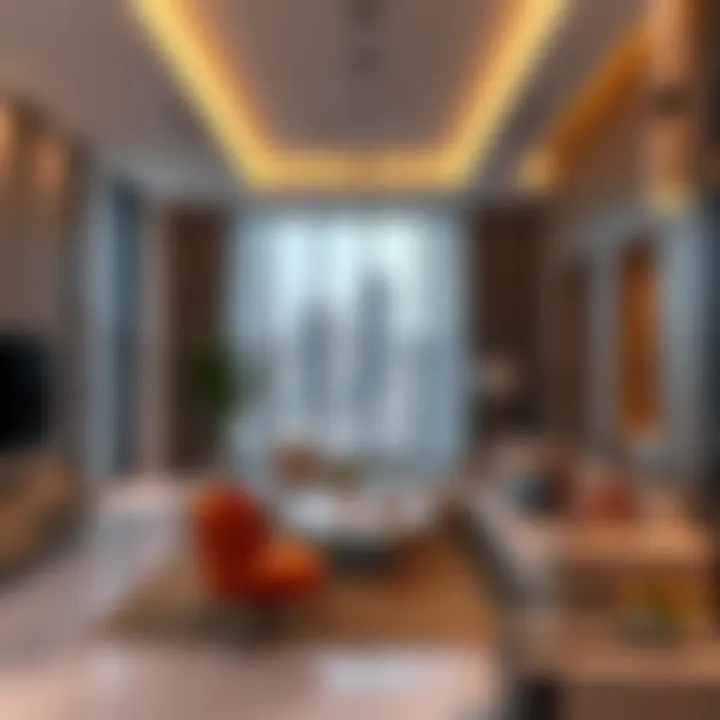Understanding Living Expenses in Dubai: A Comprehensive Guide


Intro
Living in Dubai offers a unique blend of luxury, diversity, and opportunity. However, navigating the financial landscape can feel like a labyrinth if you're not well-informed. From exorbitant housing prices to the surprisingly affordable costs of some everyday items, understanding the nuances of living expenses in this sparkling desert metropolis is essential.
In this guide, we will cover several vital aspects that collectively shape the living experience here: housing, utilities, transportation, food, and healthcare. We will provide insights that will help both expatriates and locals create effective budgets, making daily life in Dubai both enjoyable and financially sustainable.
As the city continues to grow and evolve, staying updated on market trends and future developments is key to making informed decisions whether you're relocating, investing, or simply exploring the possibilities of life in Dubai. Understanding these elements will facilitate a smoother transition, offering clarity as you plan your move or assess your financial commitments.
In the sections that follow, we will dive deep into housing market insights, effective budgeting strategies, and tips that cater specifically to the diverse community residing in Dubai.
Foreword to Living Expenses in Dubai
Living in Dubai, a city that's often painted as a glittering oasis of luxury and opportunity, comes with its fair share of considerations—most notably, living expenses. Understanding these costs isn't just about numbers on a spreadsheet; it’s about making informed decisions that directly affect your quality of life here. The relevance of contemplating living expenses goes beyond the basics of rent and utility bills. It provides a deeper view into the financial landscape one can expect when laying down roots or setting up a business.
The UAE, Dubai in particular, is a melting pot of cultures and fiscal prospects. For expatriates, investors, and even seasoned residents, familiarizing oneself with the cost of living is crucial. Housing costs can vary wildly depending on the neighborhood—whether you’re after a high-rise apartment with breathtaking views of the Burj Khalifa or a more modest setup away from the bustling city center, the choices are manifold.
Moreover, utility expenses and transportation are key players in the monthly budget. Without understanding these basic elements, one might find themselves grappling with financial surprises that could lead to undue stress. For instance, air conditioning is a must-have in the blistering summer; thus, cooling expenses can seriously affect your monthly financials.
In addition to the tangible fees for living and commuting, one must also consider the socio-economic factors that impact the lifestyle in Dubai. The food scene ranges from street vendors serving shawarma to high-end restaurants offering gourmet meals, each having its own price tag attached. A robust understanding of these expenses allows residents and investors to adapt their financial strategies effectively.
In summary, grasping the complexity of living expenses in Dubai is essential for smooth transitions—whether you’re planning to relocate, expand your business ventures, or simply settle into this vibrant city. This guide aims to break down the essential aspects you need to be aware of to navigate the financial landscape of Dubai successfully.
"Understanding your living expenses is not just about managing money; it's about mastering your life in a city that never sleeps."
Taking the plunge into the expat life or property investment in Dubai necessitates not only an excitement for the culture and opportunities but also a practical mindset to handle day-to-day living expenses. From housing to daily groceries, the financial picture will encompass myriad factors that are worth exploring in detail.
Housing Costs
Housing costs play an essential role in the overall expenses of living in Dubai. The city is known for its luxury and extravagant lifestyle, which equals up to some high housing prices. Understanding the nuances of housing is vital for anyone considering a move, investment, or just curious about life in this bustling metropolis. The choice between different types of accommodations, current rental trends, and the option of buying property are all factors that greatly influence financial planning.
Types of Accommodation
Apartments vs. Villas
When it comes to choosing a place to live, deciding between apartments and villas is a major consideration. Apartments are often seen as a more economical choice, especially for singles or small families. They usually come with shared facilities, like pools and gyms, which can save a little money on personal expenses. Conversely, villas offer more space and privacy, making them ideal for larger families or those who want a bit of room to breathe.
In terms of benefits, apartments usually require less maintenance, while villas provide a yard or garden, appealing to those who enjoy outdoor living. However, the major drawback? Apartments can be noisy and cramped, especially in a city that never sleeps. Villas, while spacious, can come with a hefty price tag.
Furnished vs. Unfurnished
This choice greatly impacts living expenses. Furnished apartments can be a convenient option for expats or those on a short-term stay, eliminating the need for furniture shopping and setup. Many expats prefer this option because it allows for an easy transition without the hassle of buying and then selling furniture. On the other hand, unfurnished apartments can sometimes be cheaper, but they demand upfront costs for setting up a living space.
While furnished places offer convenience, unearthing an unfurnished apartment allows for a more personalized touch, making it feel like home. Just keep in mind that if you go for unfurnished, you're taking on the initial costs of appliances and furniture, which can run up quite the expense.
Rental Trends
Average Rental Prices
Average rental prices in Dubai can give potential residents a snapshot of what they might expect to pay. On the whole, rental costs vary greatly, influenced by property type and location. In bustling areas like Dubai Marina or Jumeirah, expect to cough up more than in outskirts like Dubai Sports City. The typical one-bedroom apartment can range from AED 5,000 to AED 15,000 per month, making budgeting an important consideration. Understanding these averages can help newcomers gauge what they can afford.
Neighborhood Variability
Not all neighborhoods in Dubai are created equal. The variability in neighborhoods can affect living costs significantly. Some areas are more luxurious and sought after, boasting amenities and views that come with a premium. For instance, areas like Downtown Dubai are tourist hotspots, bringing with them higher prices. In contrast, neighborhoods like Bur Dubai may offer more budget-friendly options. Thus, weighing location against financial capability is a critical element in the decision-making process.
Buying Property
Mortgage Options
For those contemplating settling down in Dubai, understanding mortgage options is key. Mortgages for expatriates can differ significantly from those available to locals. Banks here consider the high transaction rates in the property market, leading to various financing plans. Some may require a higher down payment, especially for non-residents. The process can be complex, but having a grasp on types of available mortgages can alleviate some of that stress.
Property Taxes
Although Dubai is favored for its no-income-tax situation, potential property owners should understand the associated costs with buying property. Property taxes might not be the first thing that comes to mind, but they play a vital role in budget planning. There are registration fees that apply, as well as ongoing maintenance costs when owning a property. These taxes can weigh on your finances, especially if unexpected expenses arise, so it’s wise to conduct thorough research before committing.
Utilities and Internet
Living in Dubai comes with its unique set of challenges, and understanding utilities and internet expenses is key to achieving a well-rounded view of living costs. Water and electricity form the backbone of daily life, facilitating household activities. Meanwhile, reliable internet has become almost a lifeline, tying residents to work, social life, and entertainment. Managing these bills effectively can help residents avoid any financial surprises down the line, making it important to nail down what one can expect when it comes to utilities and internet in Dubai.
Typical Utility Costs
Electricity and Water Bills
When considering monthly living expenses, electricity and water bills can take a significant chunk of the budget. Dubai's climate, with its harsh summers, means reliance on air conditioning is almost paramount. In fact, many households might find that upwards of 60% of their electricity consumption comes from cooling systems. Utility rates, set by the Dubai Electricity and Water Authority (DEWA), are relatively competitive, but can still vary based on individual consumption patterns.
Often, residents find themselves caught off guard by fluctuating usage levels; for instance, a family that spends a lot of time at home may see noticeably higher bills compared to a household that is more frequently away. Additionally, conscientious use of energy and water can lead to considerable savings.
Key features regarding these bills include:
- Fixed charges: DEWA adds a basic fixed fee to the utility bills, regardless of usage.
- Subsidies: There are some subsidies available for Emiratis to cushion their expenses, though expatriates won't benefit from these.
These factors contribute to shaping expectations for expense management in utilities.
Cooling Expenses
Cooling expenses in Dubai can sometimes feel like a necessary evil. With temperatures soaring, the cost of cooling your home often rivals other major expenses. The air conditioning not only combats the external heat, but it’s vital for overall comfort and well-being. However, it’s sensible to recognize that running such systems constantly can lead to straining your financial resources.
A common misconception is that turning down the temperature significantly will cool a room faster. In reality, it may lead to higher consumption without much added benefit. Moreover, many buildings now feature energy-efficient cooling systems now, balancing comfort with cost.
Advantages include:
- Improved technology: Many condos and villas are designed for energy efficiency.
- Advanced controls: Smart thermostats can provide savings through precise management compared to traditional systems.
Navigating cooling expenses involves a careful balance of comfort and smart financial planning.
Internet Services
Service Providers
In Dubai, selecting an internet service provider can be a pivotal decision. Major players such as Du and Etisalat dominate the landscape, each offering a range of services tailored to different user needs. With options spanning from basic to premium plans, the choice can be tailored to match personal or business requirements.
The competitive nature of these providers often results in promotional offers that can make switching services appealing for newcomers. Customers should carefully weigh speed against cost to ensure they select the plan that aligns with their lifestyle or work requirements.
Key characteristics of local service providers include:


- Significant coverage: Most residential areas have access to high-speed services.
- Bundled packages: Some providers offer internet bundled with television and landline options, often at a discounted price.
Choosing the right provider can lead to a better online experience with cost savings.
Average Monthly Fees
On the topic of fees, residents can expect to pay, on average, around 300 to 500 AED monthly for internet services, depending on the speed chosen. For a single person or a small family, this can be a reasonable investment, especially considering the importance of stable, fast internet access. However, it’s vital to read the fine print of any agreement, as additional charges may apply for exceeding data limits or specific service features.
Some unique features include:
- Various plans available: Options exist for different average usage levels, making it suitable for casual browsers as well as heavy users.
- Promotional offers: Many providers have frequent sales, hitting the budget-conscientious consumer with attractive deals.
Understanding the typical expenditures associated with utilities and internet will support future residents to not only settle comfortably but also maintain a firm grip on financial expectations.
Transportation Costs
Transportation costs play a crucial role in shaping the living expenses in Dubai. Given the city's sprawling layout and reliance on both private and public transit, understanding these costs can deeply impact one’s budget. When considering relocation or investment in Dubai, it's vital to evaluate how transportation factors into your overall financial plan.
Public transportation systems and vehicle ownership come with their own merits and drawbacks. They further reflect the broader lifestyle in the city while also dictating how much you will need to allocate for daily commutes or leisure travel.
Public Transport Options
Metro System
The Metro System in Dubai stands as a prime example of efficient urban transportation. With fully automated trains and a well-planned route structure, it seamlessly connects various key areas, making it a top choice for residents and visitors alike. One standout feature of the Dubai Metro is its cleanliness and safety, which is a rarity in many major cities.
Using the Metro can save a tidy sum compared to taxi fares or fuel expenses. For expatriates, understanding the Metro provides insight into initial costs and planning for daily expenses. However, the Metro does come with its quirks; while the stations and trains are outstanding, some areas may still require a taxi to reach your final destination, adding to overall travel costs.
Buses and Taxis
Dubai's bus system is another essential piece of the public transport puzzle. It covers a vast network across the emirate and is known for being budget-friendly. The buses are air-conditioned and operate frequently, catering to a diverse range of commuters. Many residents appreciate how the bus service can effectively reduce transportation expenses, although the trade-off is longer travel times compared to driving.
On the flip side, taxis in Dubai offer a level of convenience that appeals to many. They are relatively inexpensive compared to other global cities. A unique feature is the availability of ride-hailing services that operate in conjunction with traditional taxis, giving flexibility in choice of transport. Nevertheless, frequent taxi use can add up quickly, which is something to take into consideration when budgeting living expenses in this city.
Owning a Vehicle
Car Purchase Costs
Buying a car in Dubai is often seen as a rite of passage for many new residents. The costs vary significantly based on the type of vehicle and whether it’s new or used. One of the major attractions for purchasing a vehicle is the absence of a road tax, which can make the initial buy seem more appealing. Popular options include brands like Toyota and Nissan, often known for reliability and reasonable resale value.
Considering the vastness of the city, having your own wheels allows for greater freedom and convenience. However, it’s important to factor in additional costs like insurance and maintenance, which can fluctuate. Overall, ownership can increase monthly expenses, but it can also improve quality of life significantly if you value convenience over public transport.
Fuel Prices
Fuel prices in Dubai are notably competitive, with gasoline often cheaper than in many western countries. This affordability can make owning a vehicle more viable and attractive. Without the burden of exorbitant prices at the pump, daily commuting can feel less of a strain on finances.
However, the practicality of owning a car must be weighed against other considerations. The highly congested roads during rush hours could lead to longer commute times. Furthermore, if you’re living in areas well-served by public transit, the benefits of owning a vehicle decrease. In such cases, a sound strategy might involve considering occasional car rentals or car sharing for when independence is required without the ongoing expenses of ownership.
Food and Dining Expenses
Food and dining expenses play a significant role in shaping the overall cost of living in Dubai. This aspect is not just about filling one's stomach; it extends to cultural experiences and social interactions too. In a city as diverse as Dubai, the culinary scene reflects a blend of both local flavors and international cuisines. Understanding food costs helps residents and expatriates plan their budgets more effectively, ensuring that they can enjoy the rich tapestry of dining options without breaking the bank.
Grocery Costs
Supermarkets vs. Local Stores
When it comes to grocery shopping in Dubai, there's often a debate between heading to the big supermarkets or the local stores. Supermarkets like Carrefour or Lulu offer a vast array of products, from fresh produce to international goods. These stores are advantageous for those who appreciate variety and bulk buying, often at discounted prices during sales. However, the vastness of options can sometimes overwhelm buyers, leading to impulse purchases, which may inflate the monthly grocery bill.
On the other hand, local stores, such as Spinneys or smaller neighborhood markets, cater to the immediate needs of the community. They often provide fresh local produce and might even host seasonal fruits and vegetables that supermarkets do not carry. This aspect allows shoppers to support local businesses and give back to the community. But the convenience might come at a price, as local stores can be slightly more expensive than their larger counterparts. Thus, weighing these options can contribute significantly to budgeting.
Average Monthly Expenditure
Analyzing the average monthly expenditure on groceries is crucial for anyone living in Dubai. Typically, a single person's grocery bill may range from 1,200 AED to 2,500 AED, depending on dietary choices and preferences. Families, of course, will find their expenses higher. This expenditure is a considerable portion of one's budget, yet controlling it can be achieved through mindful shopping. Substituting international products with local alternatives can notably lower costs.
Seasonal promotions and loyalty programs offered by supermarkets provide a golden opportunity for savings. Additionally, being aware of which stores provide the best deals can ensure that residents are spending wisely. With grocery shopping being a routine task, optimizing it can lead to a healthier financial life in Dubai.
Eating Out
Restaurant Costs
Dining out in Dubai can range from wallet-friendly eateries to high-end establishments. The restaurant costs largely depend on the nature of the dining experience one chooses. Fast food chains provide quick meals at lower prices, typically averaging around 30 AED for a meal. In contrast, enjoying a meal at a mid-range restaurant could set an individual back anywhere between 100 AED to 200 AED. Such a diverse range ensures there’s something for everyone, though habitual fine dining can significantly strain the budget.
Moreover, the choice of cuisine influences prices as well. For instance, local Emirati dishes might be priced lower than high-end sushi or gourmet European fare, offering a taste of tradition without steep costs. Ultimately, context plays a vital role in determining what one pays to eat out.
Popular Dining Areas
Dubai is dotted with various popular dining areas, each offering unique culinary experiences. Places like Jumeirah Beach Residence and Dubai Marina are famous for their waterfront restaurants, serving both residents and tourists alike. These spots not only provide an array of dining options but also vivid atmospheres that make meals memorable.
However, dining in such trendy areas often comes with premium prices. Finding hidden gems in neighborhoods like Al Quoz or Karama can lead to delightful culinary discoveries that won't hurt the wallet. Furthermore, exploring these less glamorous neighborhoods can sometimes provide an authentic taste of local life, fostering a sense of belonging.
Healthcare and Insurance
Healthcare and insurance are vital topics to understand when planning to live in Dubai. As a bustling metropolis, the city offers a mix of healthcare systems that cater to both expatriates and locals. Navigating this landscape isn’t just about finding a doctor; it also involves knowing what insurance provides the best coverage and which facilities to consider.
Accessing Healthcare
Public vs. Private Healthcare
When it comes to healthcare in Dubai, there’s a clear divide between public and private options. Public healthcare in the UAE can be quite appealing due to its cost-effectiveness. Many expatriates initially gravitate towards it, especially when they learn about the subsidized services available to residents. These facilities often provide basic healthcare needs at a fraction of the cost you’d pay elsewhere.
However, the waiting times can be longer, and the amenities may not always be on par with the private sector. On the flip side, private healthcare is generally more tailored to individual needs. Many of the private hospitals boast modern technology and shorter wait times, a considerable advantage when time is of the essence. This often makes private healthcare the favored choice for many, especially in emergency situations. The drawback? The costs can quickly add up if one is not adequately insured.
Quality of Care
Quality of care in Dubai is notably high, and that’s a hallmark of the city’s reputation. Hospitals often employ highly trained staff who are proficient in their fields. This guarantees not only better outcomes but also a more personalized treatment approach. For expatriates, this might be the comforting factor they need when they have to rely on a foreign healthcare system.
However, it’s essential to be aware that the quality of care can vary significantly depending on the facility chosen. Some may provide exceptional services while others might not meet the same standards. Consequently, understanding how to gauge the quality of care at different institutions is paramount for anyone planning to live in Dubai.
Health Insurance Expenses
Types of Coverage
Understanding the types of health insurance coverage available can make a world of difference. In Dubai, insurance policies typically fall into categories such as basic, comprehensive, and family plans. Basic plans cover essential services, but often leave out critical areas such as specialist consultations or certain treatments. Comprehensive coverage, however, generally includes extensive services, which gives individuals peace of mind when it comes to healthcare.


The choice boils down to personal needs and budget. For families, a family plan might be more economical than purchasing separate policies. On the other hand, individuals looking for targeted coverage might be better off with a more tailored plan that suits their specific requirements.
Average Premiums
When it comes to average premiums for health insurance in Dubai, the figures might come as a shock to some. Generally, they range between AED 500 to AED 3,000 monthly, depending on the plan selected. Basic plans are on the cheaper end, while comprehensive coverage can reach toward the higher end of that scale. Understanding these costs is crucial for budgeting and planning for living expenses in the city.
Moreover, these premiums can include benefits such as unlimited outpatient visits, coverage for pre-existing conditions, or annual health check-ups, which can justify a higher price point. Knowing what each plan includes can help individuals make an informed choice, ensuring they strike that delicate balance between cost and comprehensive care.
Education Costs
Education is a paramount consideration for families relocating to Dubai. As one evaluates living expenses, understanding education costs becomes crucial, since it directly impacts financial planning and family life. Factors like school choice, location, language of instruction, and curriculum can significantly vary the expenses involved. Families often find themselves weighing the benefits of international vs. local schooling systems, each bringing its own set of pros and cons.
Schooling Options
International Schools
International Schools in Dubai are known for their diverse curricula that cater to expatriate communities. These institutions typically follow American, British, or International Baccalaureate systems, which might be more familiar to foreign families. The appeal of International Schools lies in their inclusive environment, often offering various extracurricular activities and programs that not only focus on academics but also on personal development.
Key characteristics of these schools often include top-notch facilities, bilingual teachers, and a strong emphasis on global citizenship. Many parents view these schools as a beneficial choice since they provide a smoother transition for their children and help maintain their cultural identity. However, the financial commitment is substantial. The tuition fees for these schools can be significantly higher than local options, which might be a disadvantage for families on tighter budgets.
“Choosing the right school can feel like navigating a maze, but understanding your options is the first step.”
Local Schooling
Local schools in Dubai present another avenue for education, often catering to the expatriate community while also serving Emirati children. These schools tend to follow the national curriculum, which is aligned with the UAE's educational goals and values. They can be seen as a popular choice for families looking to better integrate into the local culture and society.
A striking advantage of local schooling is the generally lower tuition fees compared to their international counterparts. This can greatly benefit families seeking to cut down on education expenses. Furthermore, local schools may offer a unique perspective on Emirati culture, which can enhance the child’s education. However, language barriers can arise, and the curriculum may not align with the expectations of families accustomed to international standards.
Tuition Fees
Tuition fees are a significant component of education costs in Dubai, varying widely based on the type of school and year level. Average Annual Tuition for international schools can range from AED 30,000 to AED 100,000 or more, depending on the institution.
Average Annual Tuition
The average annual tuition of Dubai's international schools is steep, particularly when compared to local institutions. This financial factor plays an integral role in budgeting for families planning to relocate. Nevertheless, parents often perceive the cost as a worthwhile investment in their child’s future, reflecting on the quality of education and facilities offered.
One must also consider that some of these schools provide payment plans and scholarships, making it possible for families to manage costs more effectively, hence providing an alternative option against the hefty price tag.
Additional Costs
When planning for education expenses, it’s essential to factor in additional costs that often accompany tuition fees. These can include uniforms, textbooks, transportation, and extracurricular activities, all of which can add a substantial amount to the overall expenditure. For instance, uniforms may cost between AED 500 to AED 1,500, depending on the school.
These additional expenses can accumulate, sometimes resulting in the annual education cost doubling. Thus, while tuition may seem manageable on its own, families need to budget accurately for a more comprehensive view of educational needs.
In summary, education costs play a vital role in the living expenses landscape in Dubai. With various schooling options available, families must weigh the costs against the quality of education to make informed decisions that best reflect their needs and financial capacities.
Entertainment and Leisure
Understanding the dynamics of life in Dubai involves more than just crunching numbers related to rental prices and utility costs. While the foundational aspects of living expenses are essential, the vibrancy of entertainment and leisure activities plays a crucial role in shaping one's lifestyle in this unique city. Residents and expatriates alike seek a balance between work and play, and Dubai offers a plethora of both.
For those navigating the financial landscape here, recognizing the costs associated with leisure can inform budgeting strategies and influence quality of life decisions. Entertainment in Dubai is not just about expenditures; it's also about experiences, culture, and community engagement.
Leisure Activities
Cultural Events
Cultural events in Dubai stand as a testament to the city's rich heritage and multicultural fabric. These happenings, ranging from art exhibitions to music festivals, not only showcase local talent but also draw international artists, creating a vibrant atmosphere unique to Dubai. The contribution of cultural events to the overall living experience cannot be overstated; they foster connections among diverse communities, enabling residents to engage with the local cultural scene. Besides enhancing quality of life, they also present unique networking opportunities, particularly beneficial for expatriates looking to integrate.
- Key Characteristics: Diversity and Accessibility - From free art shows at Alserkal Avenue to ticketed concerts at Dubai Opera, there's something for everyone.
- Advantages: Participating in these events enriches one's social life, educates about various cultures, and serves as a form of affordable entertainment.
- Disadvantages: On the flip side, while many events are affordable, others can come with hefty price tags, especially if VIP experiences are desired.
Outdoor Activities
Dubai's outdoor activities capture the essence of its environment, transforming the city's desert and coastline into playgrounds for residents and tourists. Activities such as dune bashing in the desert or kayaking in the mangroves not only provide excitement but also promote a healthy lifestyle. Outdoor experiences are crucial for mental well-being, offering residents a chance to unwind beyond urban confines.
- Key Characteristics: Diverse Offerings - Options range from tranquil beach strolls in Jumeirah to adrenaline-pumping adventures in Hatta.
- Advantages: Engagement in these activities can help combat the sedentary lifestyle generally associated with an urban setting, fostering a balanced lifestyle.
- Disadvantages: Weather can be a significant drawback, as outdoor activities can be limited during the sweltering summer months, leading to a preference for indoor options.
Social Life Costs
Navigating the social scene in Dubai comes with its own set of costs that can significantly add to the monthly budget. For those new to the city, understanding these costs is vital for managing personal finances while maintaining an active social life.
Bars and Clubs
The nightlife in Dubai provides a luxurious playground for those looking to unwind after a long week. With a range of bars and clubs that cater to diverse tastes—from upscale rooftop lounges with breathtaking views to casual pubs—Dubai's nightlife is lively and varied. However, it’s essential to consider how much one is willing to spend to enjoy these experiences.
- Key Characteristics: Extravagance and Variety - The variety in venues means something is available for all budgets, from extravagant to more economical options.
- Advantages: A vibrant nightlife fosters social interactions and networking opportunities, critical in both personal and professional aspects of life in Dubai.
- Disadvantages: Prices can quickly escalate, particularly for drinks and entry to exclusive events, leading to unexpected spikes in the monthly budget.
Membership Fees
Many expatriates and residents in Dubai opt for memberships at clubs or professional networks. These can range from sports clubs to exclusive business networking groups and high-end fitness centers. Understanding these membership costs is crucial for anyone looking to engage deeply with the community.
- Key Characteristics: Exclusive Access - Memberships often provide access to facilities and events not available to the general public.
- Advantages: They can enhance one’s quality of life and provide opportunities for professional development, making them a worthwhile investment for some.
- Disadvantages: The fees can be substantial, and not engaging fully can lead to wasted expenditures if costs aboard are not carefully managed.
Overall, entertainment and leisure costs are pivotal considerations when planning for life in Dubai. By apprehending the expenses linked to leisure activities and social engagements, individuals can efficiently tailor their budgets to accommodate both enjoyment and financial prudence.
Clothing and Personal Expenses
Clothing and personal expenses play a vital role in understanding the cost of living in Dubai. For many expatriates and residents, these elements can greatly impact overall budgeting strategies and lifestyle choices. The fashion scene in Dubai reflects its diverse population and dynamic culture. From high-end designer boutiques to local markets, the choices can be overwhelming. Having a grasp on these costs not only aids in managing finances but also in fitting into the social fabric of the emirate.
Average Clothing Costs
Local vs. Imported Brands
When it comes to clothing in Dubai, there’s a noticeable divide between local and imported brands. Local brands often offer styles that resonate with the Middle Eastern culture while being generally more affordable. Think of brands like "Splash" and "Max," which provide trendy apparel without breaking the bank. Imported brands, though pricier, showcase global fashion trends, featuring labels like "Gucci" and "Prada".
The key characteristic of local brands is their affordability and cultural relevance, while imported brands tend to flaunt exclusivity and high fashion. This makes local choices beneficial for day-to-day wear, as they are both stylish and light on the wallet. However, the disadvantage lies in the limited variety compared to international brands, often leaving fashion enthusiasts craving more.
Seasonal Shopping
Seasonal shopping in Dubai can be quite the game changer for budget-conscious shoppers. Different seasons often bring significant sales and promotions, especially during the Dubai Shopping Festival. This event is an excellent opportunity to snag international brands at discounted prices.
The unique feature of seasonal shopping is the timing; savvy consumers can plan their wardrobe around these sales, ensuring they get more bang for their buck. However, one must be cautious not to get swept up in the hype, as some sales focus on products with limited demand, which might not always reflect current trends.
Personal Care


Salon Services
Dubai boasts a myriad of salon options ranging from luxury to budget-friendly locales. It’s not unusual to see salons offering high-end services at a premium price, such as "Nailology" or "Toni & Guy," where customers expect top-notch service.
The key characteristic of salon services in Dubai is their quality and range of offerings, including everything from haircuts to intricate styling. These services are often considered a must-have for residents looking to maintain an upscale appearance in a city known for its opulence. However, the downside is that these premium services can lead to inflated personal care budgets, especially when one gets carried away by regular treatments.
Health and Wellness
Health and wellness in Dubai encompasses a broad spectrum, including fitness centers, yoga studios, and wellness retreats. Establishments like "Fitness First" are popular, often providing state-of-the-art facilities. The key characteristic of this sector is the accessibility of various health services, promoting a culture of healthy living.
Health and wellness become crucial to the overall lifestyle in Dubai, as a healthy individual often enjoys enhanced quality of life in such a bustling environment. However, joining upscale wellness programs can come with a hefty price tag, so budgeting for these services is essential for maintaining financial balance.
In essence, understanding clothing and personal expenses is a crucial step in financial planning for anyone looking to thrive in Dubai's vibrant, multicultural atmosphere.
Taxes and Miscellaneous Fees
Understanding the financial landscape in Dubai is vital for both residents and expatriates. Among the various components to consider, taxes and miscellaneous fees form a crucial part of monthly budgeting. In a city known for its vibrant lifestyle and cultural diversity, being aware of these financial obligations can prevent unwelcome surprises down the road.
Understanding Local Taxes
Tax Regulations
When it comes to tax regulations, Dubai is often seen as fairly attractive, especially for many expatriates. The UAE does not impose income tax on salaries, which is a key characteristic making it a popular choice for those looking to relocate. Instead, taxes are primarily collected through various indirect taxes, such as the Value Added Tax (VAT) introduced in 2018, which is set at a low rate of 5%.
This characteristic of razor-thin taxes can be beneficial but requires residents to be acutely aware of how this impacts other areas of their lives. For instance, while property owners pay a registration fee when purchasing a home, the absence of income tax can lead to higher disposable income that residents might spend elsewhere.
However, a unique feature of Dubai's tax regulations is that there are specific deductions and allowances one must stay informed about. Being oblivious to such details might lead to financial pitfalls, although the overall tax burden remains lower than in many Western countries.
Implications for Residents
From a residential standpoint, understanding tax implications means grasping how Dubai's distinctive tax regime shapes financial planning. The lack of personal income tax is a significant draw, and this aspect contributes to the overall attractiveness of settling here.
Additionally, the absence of taxing on foreign earnings means that expatriates can retain more of their income. However, there's a flip side; because many goods and services have a VAT, residents will still find their expenses affected. Such implications highlight the delicate balance between a desirable tax climate and the indirect costs that might catch individuals off guard.
In many ways, navigating the tax environment is as essential as it is convoluted. Residents must consider how VAT impacts the cost of living, particularly in sectors where pricing may not be clearly advertised, leading to unexpected financial burdens.
Miscellaneous Costs
Emergency Fund Necessities
An essential aspect of personal financial management, especially in a rapidly developing city like Dubai, is the development of an emergency fund. This fund serves as a safety net, providing support during unforeseen situations such as job loss or medical emergencies. In Dubai, the characteristic of a robust emergency fund comes into play, allowing residents to maintain a sense of stability while adjusting to their spending habits.
The unique feature of needing an emergency fund is not only about having a safety net; it also reflects a broader awareness of the economic climate. The rapid pace of development in Dubai can mean that costs fluctuate, sometimes unpredictably. Thus, having a well-planned emergency fund allows individuals to adapt to changing conditions in a foreign market without resorting to drastic measures.
Unexpected Expenses
Unexpected expenses are almost a given. Whether it's an unforeseen medical bill or sudden home repairs, these can pop up when least expected. In the context of living in Dubai, this unpredictability can be particularly daunting because of the limited options for cheaper services compared to some other cities. The high costs associated with these surprises can put a strain on monthly budgets.
Residents must keep this in mind while planning their finances. Embracing the reality of unexpected expenses means factoring in a buffer in monthly budgets. This approach supports a more balanced view of expenses, taking into consideration that while life in Dubai can be luxurious, it can also be financially demanding.
"A penny saved is a penny earned," but forgetting to plan for the pennies that might unexpectedly fly out the window can lead to complications.
Budgeting Strategies
Understanding budgeting strategies is essential for anyone living in Dubai, especially for expatriates balancing unfamiliar costs against their income. When moving to a lavish yet expensive city like Dubai, having a solid grasp of how to manage finances can make or break the ease of your transition. Adequate budgeting fosters financial awareness, enabling residents to allocate their resources wisely, plan for unexpected expenses, and stay in control of their financial health. It’s not merely about limiting expenditures; rather, it’s about maximizing the value of every dirham you earn.
Creating a Budget
Analyzing Income
Analyzing income is the backbone of any effective budgeting strategy. Without a clear picture of your earnings, it’s like trying to navigate a desert without a map. The process involves collecting all potential revenue streams, including salary, investments, or any side hustles. One key characteristic of analyzing income is its accuracy; it necessitates a careful examination of all incoming funds, leaving no stone unturned. This precision is essential for understanding your financial capabilities in a city known for its high living costs.
A unique feature here is the requirement to consider the tax-free income structure in Dubai, which can be a refreshing change for many expatriates. However, this doesn’t mean that all expenses vanish into thin air. The advantage of knowing your income allows for realistic expectations and better lifestyle choices. The disadvantage could be an overconfidence that might arise if one ignores variable or unexpected inflows.
Tracking Expenses
Tracking expenses comes into play post analysis, acting as a compass guiding your spending. It involves documenting every dirham spent on necessities, wants, and unexpected costs. The primary benefit of tracking expenses is visibility; it helps identify where your money disappears, potentially catching issues before they spiral out of control.
A notable characteristic is the varied methods of tracking: from pen-and-paper to mobile apps, there’s no shortage of tools. The modern-day financial apps can simplify this task, providing graphs and insights that make understanding your spending easy – which is crucial when faced with Dubai's wide-ranging cost of living.
However, a downside to tracking expenses can be the potential obsession with micromanaging every purchase, which might lead to unnecessary stress. Finding a balance will be key.
Savings Tips
Cutting Unnecessary Costs
The practice of cutting unnecessary costs plays a pivotal role in budgeting, ideally fitting into a comprehensive financial plan. It involves scrutinizing ongoing expenses and eliminating those that don’t align with one’s priorities. A primary characteristic of this approach is making informed choices; identifying subscriptions, habits, or lifestyle decisions that drain finances without delivering real satisfaction.
This method shines when it comes to negotiating lower costs in areas such as dining out or entertainment. Those who embrace cutting unnecessary costs often unlock further savings that can be redirected to essentials or investment opportunities. However, the disadvantage lies in the potential to overlook small pleasures that contribute to overall happiness. Budgeting should not turn your life into a dull account book.
Promoting Financial Discipline
Promoting financial discipline is not just a tip but an essential mindset required for effective budgeting. This aspect includes developing habits that naturally align with saving and wise spending. One of its key characteristics is consistency; practicing discipline daily leads to long-term financial success and security.
The focus here is often on accountability – whether that’s involving family, using budgeting apps, or setting reminders. The advantage is clear: disciplined individuals are generally more aware of their financial standing and can lead a stress-free life in an expensive environment.
However, there is a downside. Being overly strict might lead to self-denial and dissatisfaction in life, counterproductive to the very purpose of budgeting, which is to make every dirham count for your better quality of life.
In summary, understanding budgeting strategies involves a comprehensive grasp of income analysis, expense tracking, and disciplined savings. This can make living in Dubai not just possible but pleasurable, allowing one to thrive in this dynamic and often extravagant city.
Closure
In the ever-evolving landscape of Dubai, understanding the myriad aspects of living expenses is critical. As a cosmopolitan hub, the city attracts a diverse population, including expatriates, investors, and analysts. For anyone contemplating a move to this vibrant city or even those looking to invest, comprehending these expenses is not just advantageous; it is essential.
First and foremost, one must appreciate the intricate interplay between different cost facets. Housing, for instance, takes a substantial chunk of an individual’s budget. Renting variations in neighborhoods greatly influence overall living expenses. Whether you opt for a luxurious villa in Palm Jumeirah or a cozy apartment in Deira, knowing where your hard-earned dirhams are going helps you make informed decisions.
Moreover, utilities and internet services can catch new residents off-guard. With the scorching summer months necessitating significant cooling expenses, a realistic view of utilities, including average electricity and water bills, cannot be overstated. It’s this sort of insight that allows for proper budgeting and avoids unwelcome surprises.
Transportation is another piece of the puzzle. Familiarizing yourself with public transport options can save you time and money. The Metro, along with buses and taxis, provides convenient alternatives to car ownership — which can be a hefty financial commitment when you take into account purchase costs and increasing fuel prices.
Food and healthcare are equally pivotal components in the total cost of living. Dining out might be less expensive in local eateries compared to high-end restaurants, and understanding basic grocery prices can help sharpen your wallet's edge. Meanwhile, healthcare, particularly in a country where private insurance is often necessary, must be factored into your planning. Knowing the premium rates can guide you towards a healthier financial future.
Education costs are another crucial consideration, especially for families. While international schools offer high-caliber education, the associated tuition fees can be daunting. It's vital to weigh the long-term benefits of these arrangements against their costs, ensuring they align with your overall financial strategies.
Leisure and personal expenses, including entertainment, clothing, and personal care, might seem like minor details but can add up. Regular budgeting strategies will help individuals manage these recurring costs and keep them from spiraling out of control.
In sum, approaching the living expenses in Dubai with a strategic mindset brings its own set of advantages. It encourages financial literacy and discipline, enabling newcomers and residents alike to thrive in this bustling metropolis. By comprehensively understanding all these elements, residents can navigate Dubai's financial landscape adeptly, ensuring their stay is as rewarding as possible.
"Financial literacy is not just a skill; it's a necessity in a city that never sleeps."
As Dubai continues to grow in cultural richness and economic opportunity, being informed about living expenses will empower you to make choices that align with both your lifestyle and financial goals. Only then can one truly enjoy everything this dazzling city has to offer.











